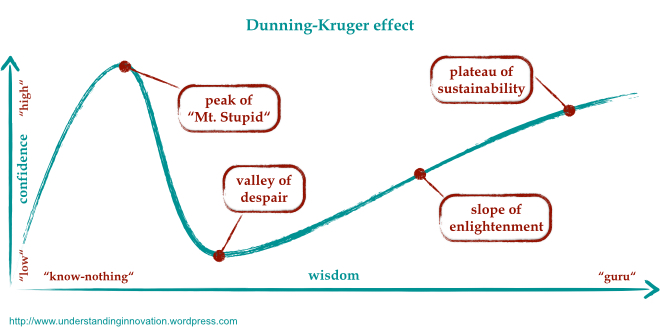Understanding the Illusion of Competence #
As we explore the power of self-image, it’s crucial to confront a significant cognitive pitfall: the Dunning-Kruger effect. This bias describes a phenomenon where individuals with low ability in a specific area tend to vastly overestimate their competence. In essence, they are too unskilled to recognize their own lack of skill, leading to a dangerous, unearned confidence—often humorously dubbed the “Peak of Mount Stupid.”

“The whole problem with the world is that fools and fanatics are always so certain of themselves, and wiser people so full of doubts.” — Bertrand Russell
The Rider and the Unaware Horse #
For the Seeker, the Dunning-Kruger effect is a critical trap. It prevents genuine learning and growth because it blinds us to our own deficiencies. In our core analogy, this is the Rider who, having only glanced at a map, confidently leads their Horse into a swamp, dismissing the Horse’s hesitation and the rustling sounds in the bushes as irrelevant. The Rider believes they know best, but their overconfidence is rooted in ignorance, not expertise. The Horse, representing the subconscious, follows the Rider’s misguided confidence, unaware of the impending trouble.
Universal Pitfalls of Overconfidence #
This effect isn’t limited to any single domain. Consider a new manager who, after a few early successes, believes they understand team dynamics better than their experienced colleagues, leading to poor decisions and demotivated staff. Or a novice chef who, after mastering a simple recipe, attempts a complex dish for a large dinner party, resulting in culinary disaster. In any field, a lack of self-awareness combined with overconfidence can lead to significant setbacks and missed opportunities for genuine improvement.
My Own Encounter with “Mount Stupid” #
Early in my trading journey, after a few lucky wins, I found myself standing squarely on the Peak of Mount Stupid. I remember a period where I felt invincible. I’d glance at a chart, make a snap decision, and when it worked out, my conviction in my own genius soared. I dismissed risk management as for “amateurs” and ignored the subtle signs that my success was more about market volatility than actual skill. This overconfidence led me to take increasingly larger, more reckless positions, convinced I had cracked the code. The inevitable crash was brutal, not just financially, but emotionally. It was a painful, yet necessary, lesson in humility that forced me to confront my own ignorance and begin the arduous climb towards true competence.
Cultivating Intellectual Humility #
Overcoming the Dunning-Kruger effect requires a commitment to intellectual humility, a continuous quest for knowledge, and the courage to embrace the discomfort of not knowing. Here’s how to start:
- Seek Feedback Relentlessly: Actively solicit constructive criticism, especially from those more experienced than you. Don’t just hear it; truly listen and reflect.
- Embrace Deliberate Practice: Focus on improving specific weaknesses, not just repeating what you’re already good at. Push your boundaries.
- Measure Objectively: Rely on data and measurable outcomes, not just your feelings or perceptions of success. Keep a journal of your decisions and their results.
- Stay a Perpetual Student: Recognize that mastery is a journey, not a destination. The more you learn, the more you become aware of the vastness of what you don’t know.
The Path to True Competence #
By consciously cultivating humility and a growth mindset, you transform potential pitfalls into opportunities for profound learning. True wisdom begins when we become aware of the vastness of our own ignorance, paving the way for genuine skill development and sustainable success. This intellectual honesty is a cornerstone of the Rider’s ability to truly guide the Horse towards mastery, ensuring the journey is one of conscious choice, not unconscious compulsion.